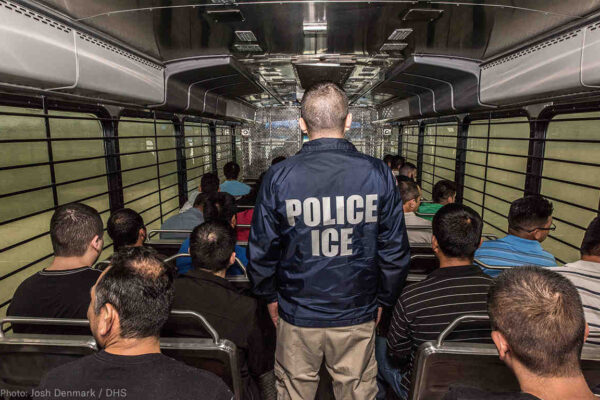Greyhound buses, once a symbol of travel on America’s vast highways, have become rolling traps where U.S. Customs and Border Protection agents routinely board to unlawfully interrogate, detain and arrest passengers.
The agents, with the agreement of Greyhound, stage surprise boardings without warrants to question riders about their citizenship and travel plans. In many cases, all too reminiscent of police states, the agents demand to see a passenger’s “documents.”
The warrantless raids, which saw a rapid increase in the past year, are not only a blatant disregard of passengers’ constitutional rights, they are also clearly driven by racial profiling.
On Wednesday, March 21, ACLU affiliates in California, Texas, Washington, Vermont, New York, New Hampshire, Michigan, Florida, Arizona, and Maine sent a letter to Greyhound Lines Inc. to urge the company to change its policies and refuse CBP permission to conduct raids on buses without warrants.
On Friday, March 23, volunteers in California will be at Greyhound bus stations in selected areas to distribute “Know Your Rights” brochures to passengers.
“Greyhound is in the business of transporting its passengers safely from place to place,” said Jennie Pasquarella, director of immigrants’ rights for the ACLU Foundations of California. “It should not be in the business of subjecting its passengers to intimidating interrogations, suspicionless searches, warrantless arrests and the threat of deportation.”
“When federal agents ignore the limits of their constitutional authority to board buses and interrogate passengers without consent or cause, all our rights are threatened,” said Adriana Piñon, policy counsel and senior staff attorney for the ACLU of Texas. “Greyhound is not required to allow immigration enforcement agents to board its buses without a warrant, nor should it, and it’s more important than ever for everyone to know and to exercise their rights when subjected to these kinds of unconstitutional interrogations.”
Examples of unlawful interrogations and searches have come from across the country.
- In California, CBP stopped a Los Angeles resident in Indio without any stated reason as he boarded a bus except that his “shoes looked suspicious,” like someone who had recently crossed the border. The man was detained to the point that he missed his bus. — In another instance, a CBP agent demanded that a Latino U.S. citizen who was filming a raid show two forms of identification.
- In Vermont, a bus arriving at 2a.m. in the Hartford area was boarded by agents. “They wouldn’t let us get off,” a witness told the Valley News newspaper, adding that the agents “only checked the IDs of people who had accents or were not white.”
- In Washington, a father and son were arrested, even though the son had DACA status and the father gave no information about his immigration status. The agent interrogating them without a warrant asked, “Are you illegal” and “Do you have your documents on you.”
- In Michigan, CBP agents boarded a bus bound for New York and detained every passenger who did not have in their possession proof of lawful status.
Greyhound issued a statement earlier this year saying the company was “required” to cooperate with “enforcement agencies if they ask to board our buses.” But that’s not true. In fact, in accordance with court decisions stemming from the Fourth Amendment of the Constitution, the company may deny CBP permission interrogate passengers aboard a bus without warrants or probable cause.
CBP agents and Greyhound have said agents do not need warrants if they are within 100 miles of the international borders with Mexico or Canada. But geography does not negate the Fourth Amendment.
The ACLU, in its “Know Your Rights” handouts, informs passengers that they have the right to remain silent and refuse searches when confronted by government agents who do not have warrants. They also have the right to record video of the incidents, even though there are reports of agents threatening people taking video of the unlawful raids.
Related Content

Sus derechos en la zona fronteriza

Your Rights in the Border Zone
Stay Informed
Sign up to be the first to hear about how to take action.
By completing this form, I agree to receive occasional emails per the terms of the ACLU’s privacy statement.
By completing this form, I agree to receive occasional emails per the terms of the ACLU’s privacy statement.


